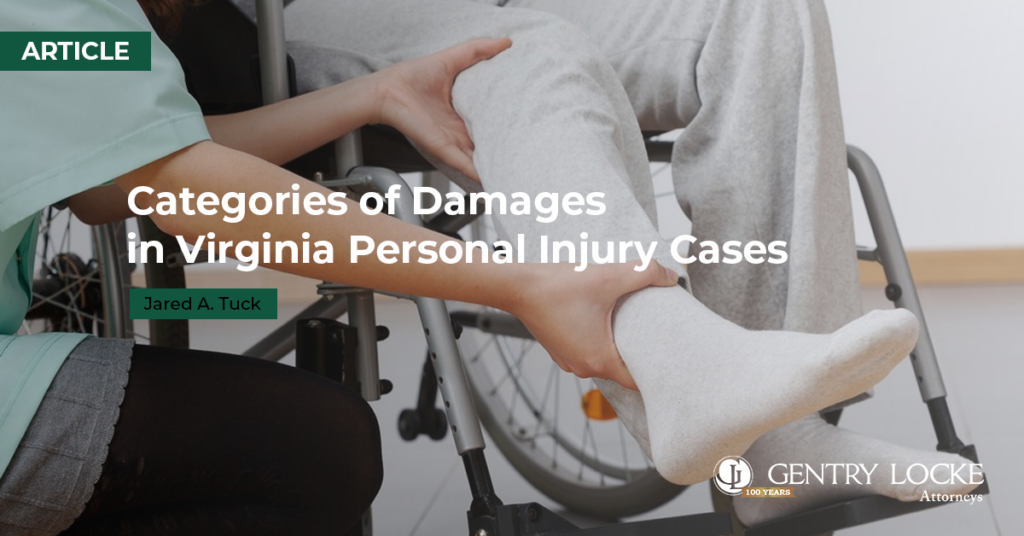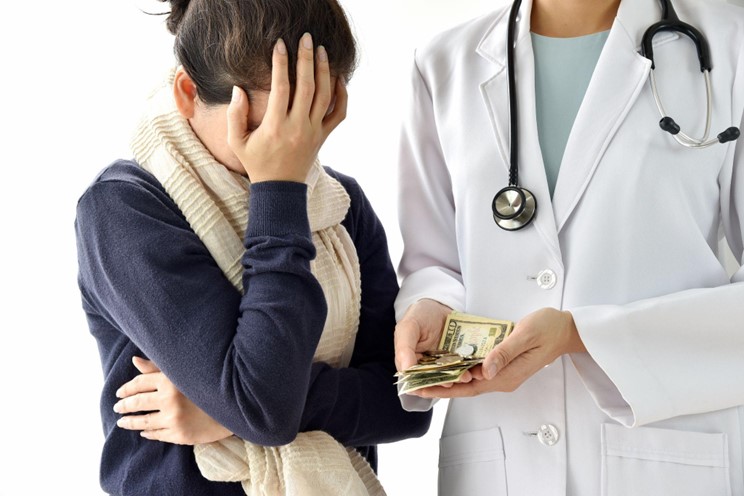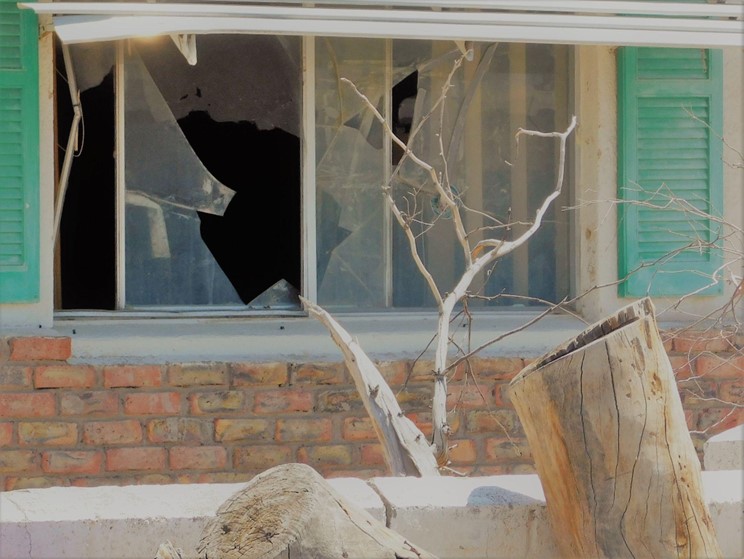Categories of Damages in Virginia Personal Injury Cases

As Virginia personal injury attorneys, our clients often ask us questions such as: What can I sue for after a car accident in Virginia? Is the defendant liable for the full amount of my medical bills? Does the defendant have to reimburse me for the time I was out of work? What about pain and suffering? Who pays for my vehicle that was totaled? Can I sue for punitive damages? This article is written by a personal injury lawyer in Roanoke who can summarize the categories of damages that are generally available to plaintiffs in Virginia personal injury cases.
The following categories of damages are available in a Virginia personal injury cases: (1) past medical expenses, (2) future medical expenses, (3) pain and suffering, (4) inconvenience, (5) disfigurement and any associated humiliation or embarrassment, (6) lost wages, (7) loss of future earning capacity, (8) property damages, (9) punitive damages for willful and wanton conduct, and (10) prejudgment and post-judgment interest.[1]
1. Past Medical Expenses
Past medical expenses are calculated by adding up the total gross amount of past medical bills that are directly and proximately caused by the defendant’s negligence. These could be urgent care bills, physician bills, hospital bills, physical therapy bills, chiropractor bills, counseling bills, pharmacy bills, durable medical equipment (DME) bills, etc.
Under Virginia’s collateral source rule, a personal injury plaintiff is entitled to full compensation from the defendant, and the jury is not allowed to consider compensation that the tort victim receives from a source collateral to the wrongdoer.[2] This means that a Virginia court or jury is not permitted to consider whether the plaintiff had health insurance to help pay his or her medical expenses following an accident.[3] Instead, the court or jury will look at the total amount that the health care provider charged the plaintiff for the treatment, regardless of any health insurance or contractual write-offs.
Often, an insurance adjuster or defense attorney will argue that at least some of the plaintiff’s past medical bills are unrelated to the accident, especially where the plaintiff is claiming aggravation of a pre-existing injury. Determining which past medical bills were caused by the defendant’s negligence or other tortious act can be difficult where the plaintiff has pre-existing injuries, was regularly receiving treatment from the same provider before the accident, or has been involved in multiple accidents. It is also tricky to calculate past medical bills when dealing with an injury such as post-traumatic stress disorder (PTSD) where the plaintiff initially receives counseling after the accident, but then later personal issues unrelated to the accident predominate in the counseling sessions.
Calculating the total amount of related past medical bills is a critical part of a Virginia personal injury case because insurance companies and defense attorneys focus heavily on “special damages,” or damages that can be easily calculated, such as past medical bills and lost wages. If you claim that too many of your past medical bills are related to the accident, then the insurance company may not take your settlement demand seriously, which may lead to years of litigation. If you do not claim enough of your past medical bills, then the insurance company may not offer you a fair settlement amount. This is one reason it is important to hire an attorney that specializes in Virginia personal injury cases.
2. Future Medical Expenses
At trial, future medical expenses are proven using expert medical testimony from either a treating or consulting physician. In Virginia, only a medical doctor, physician assistant, or nurse practitioner can testify as to the diagnosis and cause of a human physical injury.[4] Furthermore, the doctor’s opinion will only be admissible if it is stated to a reasonable degree of medical probability.[5] For example, a doctor may testify that it is more likely than not that the plaintiff will need a spinal fusion surgery in the next 10 to 15 years due to a spinal injury suffered in the accident.
Generally, the expert medical testimony is accompanied by a life care plan, which is a report that outlines the estimated costs of the future medical treatment. Life care plans are prepared by expert witnesses, usually registered nurses, who have specialized knowledge regarding the costs of future medical care, such as doctor visits, surgeries, physical therapy, specialist visits, attendant care, nurse case management, etc. Thus, the plaintiff can prove his approximate future medical expenses based on a combination of expert medical testimony regarding the care he will need and expert testimony regarding the costs of such care.

3. Pain & Suffering
Pain and suffering damages are a significant part of almost every personal injury case because physical pain and mental anguish necessarily flow from a bodily injury.[6] It is extremely difficult to calculate pain and suffering damages because pain and suffering varies on a case-by-case basis. More importantly, because this category of damages will be left up to the judge or jury to decide, it is virtually impossible to predict the value the factfinder will assign to pain and suffering. Although Virginia personal injury attorneys may ask the judge or jury to award a specific amount for pain and suffering, attorneys must weigh the risks and benefits of doing so. If the plaintiff’s attorney asks for a high amount, then it may create the appearance of greed, which may diminish the credibility of the plaintiff’s evidence and lead to a lower award. If the plaintiff’s attorney asks for a low amount, then the plaintiff may walk away with a favorable verdict, but unfair compensation.
Due to the imprecise science of attempting to predict what a judge or jury may award in a particular case, insurance companies or defense attorneys may use a multiplier to assign value to pain and suffering damages, such as two to three times the total amount of the plaintiff’s special damages. This method can be arbitrary because a plaintiff may not have many medical bills due to conservative treatment, but have a permanent injury that causes significant limitations with activities of daily living. On the other hand, a plaintiff may have a tremendous amount of related medical bills, but be completely healed. Additionally, a multiplier fails to consider what a jury may award for pain and suffering, and it does not take into consideration a defendant or insurance company’s potential exposure if the case goes to trial. Due to the arbitrary nature of multipliers, it is important to hire a Virginia personal injury attorney that is willing to take your case to trial.
4. Inconvenience
Like pain and suffering, inconvenience is a category of damages that is difficult to calculate. Inconvenience includes compensation for things such as missed time playing with your kids due to your injuries, unnecessary time spent at doctor’s offices in an effort to treat your injuries, or mental or physical limitations that prohibit you from enjoying things that you were able to do before the accident. In Virginia, a plaintiff is entitled to compensation for both past and future inconvenience caused by the defendant’s tortious conduct.
5. Disfigurement & Humiliation
Again, disfigurement is a category of damages that is hard to calculate. This category includes compensation for scarring from surgeries caused by the accident, loss of a limb, etc. The model jury instructions recognize that the humiliation and embarrassment are often associated with a disfigurement or deformity. For example, it is embarrassing for the teenager hit by a drunk a driver to use crutches at his or her high school prom. It is humiliating for someone who has lost a limb due to the defendant’s negligence to constantly be stared at by others and asked what happened.
6. Lost Wages
Lost wages is compensation for money that the plaintiff has lost prior to trial due to his inability to work from his accident-related disability. However, lost wages are not calculated by determining the actual amount of money that the plaintiff has lost due to the accident. Instead, certain rules apply. First, lost wages are based on gross income, not net income.[7] Second, due to the collateral source rule, a plaintiff is entitled to lost wages during the period disability, even if the employer decided to continue paying the wages during that time.[8] Generally, a plaintiff proves lost wages by introducing expert medical testimony regarding the plaintiff’s past inability to work due to the accident along with evidence of the plaintiff’s work schedule and gross income prior to the accident.
7. Loss of Earning Capacity
Loss of earning capacity is compensation for money that the plaintiff will lose after trial due to his inability to work from his accident-related disability. Generally, a plaintiff proves loss of earning capacity by introducing expert medical testimony regarding the plaintiff’s future inability to work due to the accident along with evidence of the plaintiff’s past job history, qualifications, education, experience, training, and work schedule.[9]
8. Property Damages
Property damages are also recoverable in a typical personal injury case, especially those involving motor vehicles. This means that in a motor vehicle collision or trucking case, a personal injury plaintiff may sue for the damage that the defendant caused to their vehicle. Property damages are calculated by “the difference in value of the property immediately before and immediately after the accident plus the necessary and reasonable expenses incurred by the plaintiff as a result of the damage to the property.”[10]

Property damage claims are usually settled prior to trial because there is less room for argument regarding the value of damaged property. Litigation can take years, and plaintiffs often prefer to resolve these claims quickly so they can purchase a replacement vehicle or repair the damaged vehicle and get it back on the road.
9. Punitive Damages
Punitive damages are available where the defendant “acted with actual malice toward the plaintiff or acted under circumstances amounting to a willful and wanton disregard of the plaintiff’s rights.”[11] The Supreme Court of Virginia has stated:
In order that one may be held guilty of willful or wanton conduct, it must be shown that he was conscious of his conduct, and conscious, from his knowledge of existing conditions, that injury would likely or probably result from his conduct, and that with reckless indifference to consequences he consciously and intentionally did some wrongful act or omitted some known duty which produced the injurious result.[12]
The purposes of punitive damages are to punish the wrongdoer, protect the public, and provide an example and warning to deter others from engaging in similar conduct.[13] The Supreme Court of Virginia generally disfavors punitive damages and has stated that such damages “should be awarded only in cases involving the most egregious conduct.”[14] This means punitive damages are not available in run-of-the-mill Virginia personal injury cases, but they may be available if the defendant’s conduct is particularly egregious.
Virginia law limits the total amount of punitive damages to $350,000.[15] The jury will not be informed of the limit on punitive damages, but if the jury returns an award of higher than $350,000, then the judge will reduce the award to $350,000.[16]
10. Interest
A plaintiff may also recover prejudgment and post-judgment interest on the court’s judgment. In its discretion, the trier of fact may award prejudgment interest and determine the time at which the interest shall begin.[17] Typically, plaintiffs sue for prejudgment interest from the day of the accident, but the factfinder is not required to award prejudgment interest from that date. A plaintiff is also entitled to post-judgment interest at the statutory rate, which is currently six percent, until the judgment is paid in full.[18]
Causation
It is important to note that a Virginia personal injury plaintiff may only recover the above damages if the evidence at trial is sufficient to show that the defendant’s negligence or other tortious act directly and proximately caused the plaintiff’s injuries. As stated above, medical testimony is almost always required to prove the element of causation because only a medical doctor, physician assistant, or nurse practitioner can testify as to the cause of a human physical injury.[19] However, if the case is in general district court, where there is no jury and the plaintiff’s recovery is limited to a maximum of $50,000,[20] then the medical records or a medical report can be introduced as evidence to prove causation.[21] Additionally, in circuit court, the judge will not instruct the jury on every category of damages, unless the evidence is sufficient to support every category of damages. For example, if the plaintiff lacks expert medical testimony as to his or her future medical treatment and costs, then the judge may not instruct the jury regarding the category of future medical expenses.
Conclusion
There are many categories of damages that may be available in a personal injury law Virginia case. However, not every category of damages is available in every case. The categories of damages available in your case will depend on the specific facts and circumstances. Many of the categories of damages, such as pain and suffering, inconvenience, and disfigurement, are not easy to calculate and judges and juries have wide latitude in determining a fair amount. Other categories, such as future medical expenses and loss of earning capacity, rely on credible expert medical testimony. This is why hiring a Virginia personal injury attorney from a personal injury law firm who is willing to take your case to trial can make a huge difference in the amount of compensation you receive after an accident. Our personal injury lawyers are dedicated to advocating for individuals who have suffered personal injuries, and we are committed to pursuing the maximum compensation possible for our clients. Contact Us to speak with a personal injury attorney.
[1] See Va. Civ. Model Jury Instruction No. 9.000.
[2] See id.
[3] See id.
[4] See John v. Im, 263 Va. 315, 321 (2002); Combs v. Norfolk & W. Ry. Co., 256 Va. 490, 496 (1998); Bean v. Dawson, 103 Va. Cir. 136. 138 (Campbell Cnty. 2019); McCarthy v. Atwood, 67 Va. Cir. 237, 246-47 (Portsmouth 2005); Va. Code Ann. § 8.01-401.2(B).
[5] See Spruill v. Commonwealth, 221 Va. 475, 479 (1980); Fairfax Hosp. Sys. v. Curtis, 249 Va. 531, 536 (1995).
[6] Bruce v. Madden, 208 Va. 636, 639-40 (1968).
[7] Hoge v. Anderson, 200 Va. 364, 367-68 (1958).
[8] See Bullard v. Alfonso, 267 Va. 743, 749 (2004).
[9] See Bailey v. Henderson, 240 Va. 1, 3-4 (1990) (holding that evidence was sufficient to support a jury instruction regarding loss of earning capacity).
[10] Va. Civ. Model Jury Instruction No. 9.050.
[11] Va. Civ. Model Jury Instruction No. 9.080; see also Booth v. Robertson, 236 Va. 269, 273 (1988).
[12] Infant C. v. Boy Scouts of America, 239 Va. 572, 581 (1990).
[13] Allstate Ins. Co. v. Wade, 265 Va. 383, 391-92 (2003).
[14] Bowers v. Westvaco Corp., 244 Va. 139, 150 (1992).
[15] Va. Code Ann. § 8.01-38.1.
[16] Id.
[17] See Va. Code Ann. § 8.01-382.
[18] See id.; Va. Code Ann. § 6.2-302.
[19] See John v. Im, 263 Va. 315, 321 (2002); Combs v. Norfolk & W. Ry. Co., 256 Va. 490, 496 (1998); Bean v. Dawson, 103 Va. Cir. 136. 138 (Campbell Cnty. 2019); McCarthy v. Atwood, 67 Va. Cir. 237, 246-47 (Portsmouth 2005); Va. Code Ann. § 8.01-401.2(B).
[20] See Va. Code Ann. § 16.1-77(1).
[21] See Va. Code Ann. § 16.1-88.2





